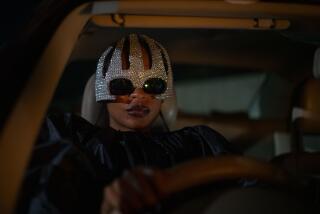Romanian cinema seizes the spotlight
- Share via
A Romanian film has won a major prize at the Cannes Film Festival in each of the last three years. In 2005, “The Death of Mr. Lazarescu,” an almost real-time chronicle of an old-timer’s descent into the chaotic Romanian healthcare system, won the top award in the festival’s Un Certain Regard section. The following year, “12:08 East of Bucharest,” a deadpan comedy in which the guests on a TV talk show look back at the 1989 overthrow of dictator Nicolae Ceausescu, took home the Camera d’Or for best first film. And in May, Cristian Mungiu’s “4 Months, 3 Weeks and 2 Days,” which details the process of obtaining a backroom abortion in the barter economy of ‘80s Bucharest, won the festival’s biggest prize, the Palme d’Or.
With the film set to open Friday, the 39-year-old Mungiu spoke about the transformation of his country from totalitarian cultural wasteland to world-cinema hot spot.
Would you say there was a moment that kick-started the Romanian new wave?
It was probably in 2002, when my first film, “Occident,” played at Cannes. That was the first Romanian film at the festival in some years and it was the first one by someone of a younger generation. I think it created a kind of positive competition and helped stimulate local filmmakers.
Is it accurate to think of this group of filmmakers as a movement?
We are perceived as a generation because we all belong to the same age group, between 30 and 40, and because we got international recognition around the same time. I think the most reasonable explanation for this new wave is that there’s a generation of people who have lived more than half their lives now in the free world where they have many more choices than before. We don’t share the same views on cinema necessarily, so it’s difficult to say that we are a school or that we have an aesthetic manifesto.
But your movies do share stylistic elements: a concern for realism, a fondness for long takes.
I suppose there is a certain gift for realism and a reaction against the kind of cinema that was made in Romania in the ‘80s when we were students. The films back then were very fake and overacted and propagandistic. Because of that I think we developed a desire to make films that talk about life.
People call this the Romanian new wave. Was there a “first wave” and if so, when?
There have been high points here and there, but honestly I think the greatest period is happening now. The most respected filmmaker locally is Lucian Pintilie, who made a film in 1968 called “Reconstruction,” which is considered the best Romanian film of the Communist period. If we had any other wave, it was probably around 1972, with directors like Dan Pita. After that nothing much happened because the system became much harsher. The only filmmaker who was successful internationally was Pintilie, who emigrated to France in the ‘70s.
How long did it take for the filmmaking infrastructure to come together after the end of the Communist era?
There was a fuzzy period of transition from 1989 to 1997. We had production houses that were inherited from the socialist system but without the money of that system. In 1997, a law was generated by a director named Radu Gabrea to help promote new filmmakers. The state founded the National Center for Cinematography, which collects money mostly from a tax on advertising and organizes a screenplay competition once. Now they put together enough to finance 10 to 12 films a year. We also had more and more foreign productions in Romania, like “Cold Mountain,” and that was educational for local technicians.
What are the biggest challenges facing the Romanian film industry?
We only have some 35 theaters in a country of 20 million people, and that is still the biggest problem. People very much want to see films but it’s somehow a private experience that they associate with TV or DVD or downloading films from the Internet. No one wants to go to these old communist-era theaters, which are very big and are still state-owned. For some reason they never privatized the theaters, which they are trying to do this now.
So I hear you took matters into your own hands for the Romanian release of “4 Months, 3 Weeks and 2 Days.”
Yes, I decided to bring the film to the spectators myself. With the structure that was in place, I knew it was impossible to reach too many people. So I brought in some partners who financed and organized a caravan that traveled for 30 days in towns all over the country that don’t have a cinema. We had 50% more admissions than “Ratatouille,” which was the most popular American film at the time. It was partly just to point out that people would want to see films if they had the opportunity. I’m making a documentary about that experience. It’s a film about people rediscovering cinema.
More to Read
Only good movies
Get the Indie Focus newsletter, Mark Olsen's weekly guide to the world of cinema.
You may occasionally receive promotional content from the Los Angeles Times.










